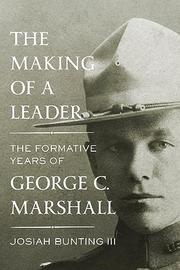George C. Marshall (1880-1959) was vital to the Allies’ victory in World War II. Unlike most other American military figures, his postwar career was not an anticlimax: He served as secretary of state, designed the Marshall Plan, and became the only general to win the Nobel Peace Prize. The author, a historian, doesn’t aim to add another standard biography but rather to examine Marshall’s formative years. Clearly an admirer, Bunting makes it clear that Marshall was a significant figure long before he became nationally known. Son of a Pennsylvania businessman, he yearned for a military career from early adolescence. Sent to the Virginia Military Institute, he didn’t excel in academics or athletics but did finish as the “outstanding man of the class” of 1901 and obtained a commission in 1902. The author emphasizes that he was already demonstrating a rigorous dedication to duty, absolute dependability, and a “cool, distancing courtesy.” He was so efficient that commanding officers loved having him on their staff, so that was where he spent most years before 1939. He accompanied the first American division overseas in 1917, overseeing its training and early battle success. In 1918, Commander-in-Chief George Pershing brought him in, and he performed brilliantly in planning operations, following Pershing when he became chief of staff after the war. During the bleak interwar years, Marshall occasionally fulfilled his desire to command troops, and he modernized training and operations as assistant commandant of the Fort Benning infantry school and as chief of war plans in the War Department. Although among the most junior brigadier generals when the existing chief of staff retired, everyone who mattered, including President Franklin Roosevelt, supported Marshall as his replacement. In this illuminating biography, Bunting agrees with the decision.

